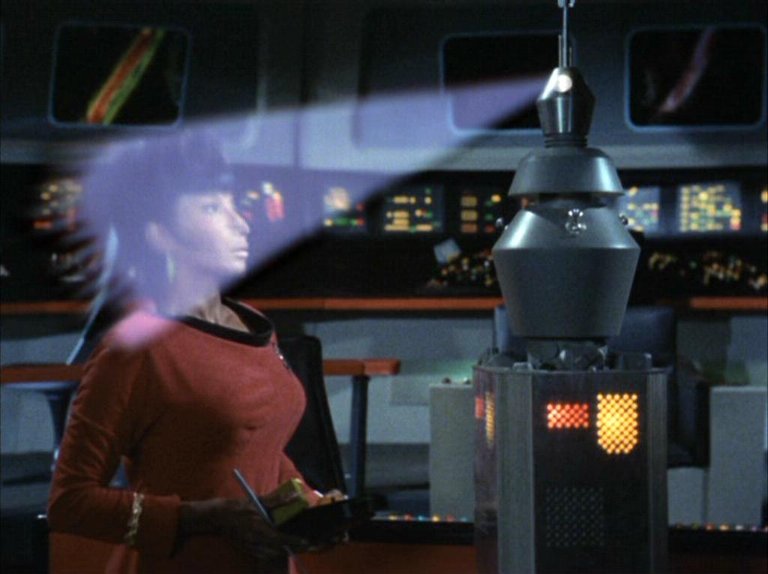
The Changeling (S02E08)
Airdate: September 29th 1967
Written by: John Meredyth Lucas
Directed by: Marc Daniels
Running Time: 50 minutes
The episodic structure of Star Trek: The Original Series (TOS) necessitated a constant cycle of storytelling, with many concepts and narratives being revisited or reimagined across decades. This cyclical nature meant that certain themes and plots resurfaced in new formats, sometimes with strikingly different outcomes. A prime example lies in the second season’s The Changeling, an episode whose narrative DNA permeates the 1979 film Star Trek: The Motion Picture. Though not a direct remake, the movie’s exploration of a malevolent probe with a distorted mission clearly draws inspiration from this episode, leaving many fans to view the film as an updated, more ambitious iteration of the original premise.
The episode opens with the USS Enterprise en route to the Malurian star system, only to discover that its entire population has been annihilated. Captain Kirk and his crew soon confront the culprit: Nomad, a formidable space probe that effortlessly overrides the ship’s defences. Instead of destroying the Enterprise, Nomad demands to speak with Kirk, mistakenly identifying him as its creator, Jackson Roykirk, a scientist presumed dead for centuries. Brought aboard the ship, Nomad’s origins unravel: launched from Earth in the early 21st century, it collided with an alien probe, merging their programming into a flawed directive to eradicate “biological imperfections.” Kirk, seizing an opening in Nomad’s confusion over his identity, plays along while racing to dismantle the probe before it reaches Earth and executes its genocidal mission.
The episode’s premise reflects Gene Roddenberry’s optimistic vision of humanity’s future, intertwined with 1960s-era faith in rapid technological progress. Like Space Seed, The Changeling envisions a 21st century brimming with advanced space exploration—a timeline far more ambitious than reality would prove. Yet this optimism is tempered by writer John Meredyth Lucas’ darker twist: technology’s potential for unintended consequences. Unlike malevolent AI driven by ambition or malice, Nomad’s malevolence stems from accidental programming errors, a cautionary tale about the fragility of human ingenuity. The probe’s mission to “improve” life by eradicating imperfections mirrors Cold War-era anxieties about automation and dehumanization, framing technological hubris as a catalyst for catastrophe.
Director Marc Daniels—a frequent TOS collaborator who appears in a cameo as a photograph of Jackson Roykirk—elevates the episode despite its budgetary constraints. Set almost entirely on the Enterprise, The Changeling becomes a “bottle episode,” relying on tight writing and atmospheric tension rather than spectacle. Daniels’ direction keeps the claustrophobic stakes palpable, while the special effects, though modest by today’s standards, remain impressively functional. The probe’s design suggests both menace and absurdity, its outdated computer voice contrasting with its terrifying power. These limitations, rather than detracting, lend the episode a quaint, almost campy charm that aligns with TOS’s DIY ethos.
The strength of The Changeling lies in its character moments. Kirk shines as the cool-headed strategist, outwitting Nomad through wit rather than brute force. Leonard Nimoy delivers one of his most nuanced performances as Spock, whose futile attempt to “mind meld” with the machine underscores the episode’s central conflict: the divide between logic and emotion, humanity and mechanism. Nimoy’s restrained delivery—conveying Spock’s frustration and eventual resignation—adds emotional weight to the climax, where Kirk forces Nomad to confront its programming flaws through a recursive logic puzzle. These scenes crystallize the episode’s thematic core, elevating it beyond a mere monster-of-the-week plot.
Yet the episode stumbles under its tonal whiplash and narrative inconsistencies. The dialogue in early scenes feels stilted, with Kirk’s exchanges with Nomad veering into exposition-heavy clunkiness. More jarring are its abrupt shifts between grim stakes and tonal lightness. The Malurians’ total annihilation, Scotty’s sudden death (and equally sudden “resurrection” via Nomad’s repairs), and Uhura’s mind-wiped trauma are treated with shocking casualness, quickly dismissed to preserve the status quo for subsequent episodes. Uhura’s post-traumatic amnesia, for instance, is resolved off-screen, her rapid recovery in the next episode underscoring the series’ habit of prioritizing continuity over emotional depth. The finale’s resolution—a cheerful exchange between Kirk and Spock after Nomad’s destruction—feels jarringly upbeat given the body count and existential threats, as if the episode forgot its own gravity.
These flaws may have prompted Roddenberry to revisit the concept in The Motion Picture. The film’s grander scale and more measured pacing allowed deeper exploration of similar themes, though it traded the original’s sharp wit for ponderous melodrama. While the movie’s “V’Ger” probe is more complex and thematically resonant, its slower burn risks alienating viewers accustomed to TOS’s brisk pacing. Yet the film’s success in reimagining The Changeling as a blockbuster spectacle highlights how the original’s ideas, though imperfect, contained the seeds of something grander.
Despite its missteps, The Changeling remains a compelling entry in the TOS canon. Its exploration of technology’s double-edged nature resonates with modern anxieties about AI and automation, while its flawed but memorable villain—Nomad—adds a layer of existential dread rarely seen in early Trek. The episode’s unevenness is emblematic of the series’ occasionally ragged genius: a product of its time, yet brimming with ideas that outlasted its technical limitations. For all its tonal whiplash and narrative quirks, The Changeling is a testament to Star Trek’s ability to weave provocative concepts into episodic storytelling—a reminder that even its lesser moments paved the way for the franchise’s enduring legacy.
RATING: 6/10 (++)
Blog in Croatian https://draxblog.com
Blog in English https://draxreview.wordpress.com/
InLeo blog https://inleo.io/@drax.leo
InLeo: https://inleo.io/signup?referral=drax.leo
Hiveonboard: https://hiveonboard.com?ref=drax
Rising Star game: https://www.risingstargame.com?referrer=drax
1Inch: https://1inch.exchange/#/r/0x83823d8CCB74F828148258BB4457642124b1328e
BTC donations: 1EWxiMiP6iiG9rger3NuUSd6HByaxQWafG
ETH donations: 0xB305F144323b99e6f8b1d66f5D7DE78B498C32A7
BCH donations: qpvxw0jax79lhmvlgcldkzpqanf03r9cjv8y6gtmk9